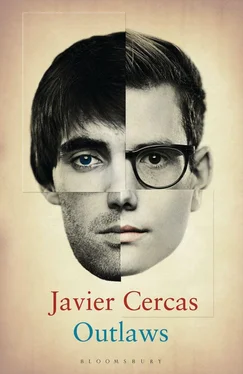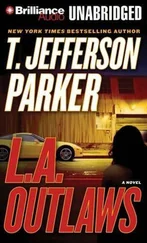‘More or less. Can I ask you one last question?’
‘Sure.’
‘What happened with Gafitas? Did he end up falling of his own accord?’
‘Why don’t you ask him?’
‘I’ve got Cañas’ version already.’
‘I’m sure it’s right.’
‘I don’t doubt it. But I’d like to hear yours as well. Why don’t you want to tell me?’
‘Because I’ve never told anybody.’
‘That makes it even more interesting.’
‘It’s got nothing to do with your book.’
‘Maybe not, but that doesn’t matter.’
‘Will you give me your word that you’re not going to use what I tell you?’
‘Yes.’
‘OK. You’ll see. At dusk on the day I arrested Zarco I showed up alone at Gafitas’ house. I didn’t want to waste time: I’d just interrogated Zarco and his two accomplices in the Bordils bank robbery for the first time at the station and, while I left the three of them stewing in their cells before waking them up in the early hours to begin the interrogation again, I decided to go after him, who was the one I suspected of being the fourth. As soon as his mother opened the door I knew I’d guessed right. It wasn’t the poor woman’s terror that betrayed her but the huge efforts she was making to hide her terror. She was so distraught that she didn’t even ask me why I was looking for her son, all she managed to say was that for the last week he had been with his father at a friend’s place, in Colera, taking advantage of the last days of the holidays; then, before I had time to ask for it, she gave me the address. An hour later I got to Colera, an isolated little seaside village, near the border at Portbou. I asked where the house was and found it not far from the beach; it was dark and looked uninhabited, but there was a car by the door. I parked beside it. I let a few seconds pass. I went and rang the bell.
‘It was his father who opened the door, a man in his forties, thin, dark-haired with no grey, who at first glance looked very little like his son. I introduced myself, told him I wanted to talk to Gafitas; he answered that he was sleeping at that moment and asked me what I wanted to talk to him for. I explained. There must be a mistake, he replied. I was with my son all morning out at sea. Are there any witnesses to that? I asked. Me, he answered. No one else? I asked. No one else, he answered. That’s a shame, I said, and added: In any case I still need to talk to your son. With a gesture that combined resignation and surprise, the man invited me in and, as we walked through the dining room, told me that he and his son had been in Colera for a week and had been going out fishing every day, although that morning they’d come back earlier than usual because of an accident. My son got a scratch from a lure when he was casting, he told me. On his arm. It was a bit gory but nothing serious; we didn’t even have to go to the doctor: I saw to it myself. When we got to the door of a room he asked me to wait there while he woke him up. I waited, seconds later he showed me into the room and I asked him to leave me alone with his son.
‘He agreed. Gafitas and I talked for a while, him sitting up in bed leaning against the wall, with his arm bandaged and his legs wrapped in a tangle of sweat-drenched sheets, me standing at the foot of the bed. Just as with his mother, I only needed to look in his eyes — more bewildered than frightened behind the lenses of his glasses — to know what I already knew: that he was the fourth man in the hold-up of the Bordils bank. I asked him a couple of procedural questions, which he answered with fake composure; then I told him to get dressed and bring a change of clothes, and finally I told him I’d wait for him in the dining room. He didn’t even want to know where we were going.
‘I walked out of the room and told the father I was arresting his son. The father listened without facing me, sitting in a rocking chair in front of the empty fireplace, and didn’t turn around. In a whisper he said: It’s a mistake. Maybe so, I accepted. But a judge will have to decide. That’s not what I mean, he clarified, turning towards me in the rocking chair, and looking at him I had the impression that he’d just removed a mask with features very similar to his own; when he spoke again I didn’t note in his voice supplication or anguish or sorrow: just total seriousness. I don’t know if my son has done what you say he’s done, he explained. I’m not saying he didn’t. But we’ve talked and he’s told me he’s sorry. I believe him; I’m only asking that you believe him too. My son is a good kid: you can be sure of that. Besides, everything that’s happened is not his fault. Have you got children? He waited for me to shake my head. Of course, you’re still very young, he went on. But I’ll tell you one thing in case you do have some one day: loving your children is very easy; what’s difficult is seeing things from their perspective. I didn’t know how to put myself in my son’s shoes, and that’s why what happened has happened. It won’t happen again. I guarantee it. As for you, what will you gain from putting him in prison? Think about it. Nothing. You told me you’ve arrested the ringleader, that you’ve broken up the gang; well, now you’ve got what you wanted. You’ll gain nothing from putting my son in jail, I tell you, or you’ll only create another criminal, because my son is not a criminal now but he’d come out of prison converted into one. You know it better than I do. What is it you’re asking of me? I cut him off, feeling uncomfortable. Without an instant’s hesitation he answered: That you give my son a chance. He’s very young, he’ll mend his ways and this will end up just being a bad memory. He’s made mistakes, but he won’t make them again. Forget about all this, Inspector. Go home and forget about my son. Forget we ever met. You and I don’t know each other, you haven’t been here tonight, you never entered this house, never spoke to me, it’s as if this never happened. My son and I will be eternally grateful. And you’ll thank yourself too.
‘Gafitas’ father stopped talking. During the silence that followed, as I held his gaze, I thought of my father, an old Civil Guard about to retire back in Cáceres, and said to myself that he would have done the same thing for me that Gafitas’ father was doing for his son, and that he might be right. You might be right, I said. But I can’t do what you’re asking of me. Your son has made a mistake, and he has to pay for it. The law is the same for everyone; if it weren’t, we’d be living in the jungle. You understand, right? There was a silence and then I went on: For my part I understand, and I’ll do what I can to soften the affidavit; with a bit of luck and a good lawyer he won’t spend more than a year or a year and a half in prison. I’m sorry. That’s all I can do. I expected Gafitas’ father would answer, maybe had the silly expectation that he’d admit I was right, or partially right; he didn’t, of course, but he nodded his head slightly as if he did, took a deep breath and, without a word, turned back to the fireplace and slumped back down in the rocking chair.
‘I waited for Gafitas, but, since he didn’t come out, without saying anything to his father I went to get him. When I opened the door to his room I found him exactly as I’d left him: sitting on the bed and leaning against the wall, his bare legs sticking out of a tangle of sweaty sheets; exactly as I’d left him or almost: the difference was that there was no longer any trace of the faked composure and his eyes weren’t the bewildered and startled eyes of Gafitas, but those of a little boy or those of a rabbit dazzled by the headlights of the car about to run over him. And then, instead of demanding he get dressed and come with me, I stood there in the doorway, quietly staring at him, without thinking anything, without saying anything. I don’t know how long I was there; all I know is that, when the time passed, I turned around and left. How do you like that?’
Читать дальше












